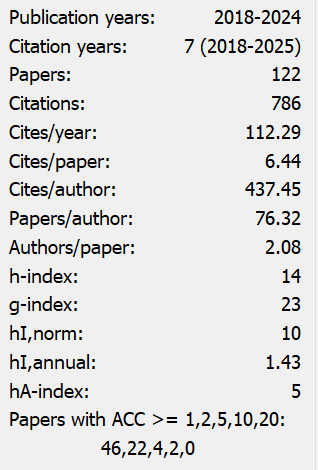Research on the Implementation Path for the Digital Transformation of Enterprise Human Resource Management Based on Project Management Theory
Abstract
Driven by the information technology revolution, digital transformation has emerged as the core driving force for corporate strategic upgrading, exerting a profound impact on enterprise operational models and human resource management (HRM) methodologies. As a critical component in the integration of digital and physical realms within enterprises, the level of technological innovation in the digitalization of human resource management directly determines the success and effectiveness of a company's broader digital transformation endeavors. However, as enterprises strive to advance this transformation, they encounter a multitude of challenges spanning technology, organizational culture, data utilization, and various other aspects. Based on project management theory, this paper conducts a systematic analysis of the necessity for enterprises to drive forward the digital transformation of human resource management. Furthermore, it constructs a transformation pathway encompassing four key dimensions: a people-centered digital management philosophy, project planning and intelligent risk management and control, digital team building and resource optimization, as well as a digital monitoring and performance evaluation system. The research aims to offer theoretical underpinning and practical guidance to enterprises seeking to establish an agile and efficient human resource management system amidst the tide of digitalization.
References
Boxall, P., & Purcell, J. (2022). Strategy and human resource management. Bloomsbury Publishing. https://doi.org/10.1093/oxfordhb/9780198749790.013.24
Bratton, J., Gold, J., Bratton, A., & Steele, L. (2021). Human resource management. Bloomsbury Publishing.
DeCenzo, D. A., Robbins, S. P., & Verhulst, S. L. (2016). Fundamentals of human resource management. John Wiley & Sons.
Fenech, R., Baguant, P., & Ivanov, D. (2019). The changing role of human resource management in an era of digital transformation. Journal of Management Information & Decision Sciences, 22(2).
Guest, D. E. (1997). Human resource management and performance: A review and research agenda. International Journal of Human Resource Management, 8(3), 263–276. https://doi.org/10.1080/095851997341630
Guest, D. E. (2001). Human resource management: When research confronts theory. International Journal of Human Resource Management, 12(7), 1092–1106. https://doi.org/10.1080/09585190110067837
Jia, J., Jiang, S., Liang, X., & Lu, F. (2024). Transforming digital resources into project management performance: A knowledge-based view. Engineering, Construction and Architectural Management. https://doi.org/10.1108/ECAM-01-2024-0038
Legge, K. (1995). What is human resource management?. In Human resource management: Rhetorics and realities (pp. 62–95). Macmillan Education UK. https://doi.org/10.1007/978-1-349-24156-9_3
Legge, K. (2014). Human resource management: A critical analysis. In New Perspectives on Human Resource Management (Routledge Revivals) (pp. 19–40). Routledge.
Nicolás-Agustín, Á., Jiménez-Jiménez, D., & Maeso-Fernandez, F. (2022). The role of human resource practices in the implementation of digital transformation. International Journal of Manpower, 43(2), 395–410. https://doi.org/10.1108/IJM-03-2021-0176
Opatha, H. H. D. N. P. (2009). Human resource management. Department of HRM, University of Sri Jayewardenepura. https://doi.org/10.31357/bkc.fmsc.00001
Parker, D. W., Parsons, N., & Isharyanto, F. (2015). Inclusion of strategic management theories to project management. International Journal of Managing Projects in Business, 8(3), 552–573. https://doi.org/10.1108/IJMPB-11-2014-0079
Purwanto, A., Purba, J. T., Bernarto, I., & Sijabat, R. (2023). Investigating the role digital transformation and human resource management on the performance of the universities. International Journal of Data and Network Science, 7. https://doi.org/10.5267/j.ijdns.2023.6.011
Richardson, G. L. (2010). Project management theory and practice. Auerbach Publications. https://doi.org/10.1201/9781439882856
Shenhar, A. J., & Dvir, D. (1996). Toward a typological theory of project management. Research Policy, 25(4), 607–632. https://doi.org/10.1016/0048-7333(95)00877-2
Stone, D. L., & Deadrick, D. L. (2015). Challenges and opportunities affecting the future of human resource management. Human Resource Management Review, 25(2), 139–145. https://doi.org/10.1016/j.hrmr.2015.01.002
Stone, R. J., Cox, A., Gavin, M., & Carpini, J. (2024). Human resource management. John Wiley & Sons.
Walker, A., & Kwong Wing, C. (1999). The relationship between construction project management theory and transaction cost economics. Engineering, Construction and Architectural Management, 6(2), 166–176. https://doi.org/10.1108/eb021109
Wood, S. (1999). Human resource management and performance. International Journal of Management Reviews, 1(4), 367–413. https://doi.org/10.1111/1468-2370.00020
Yelena, Y. (2019). Successful Digital Transformation and HRM Humanization. Economics World, 7(2), 67–74. https://doi.org/10.17265/2328-7144/2019.02.002
Zhang, J., & Chen, Z. (2024). Exploring human resource management digital transformation in the digital age. Journal of the Knowledge Economy, 15(1), 1482–1498. https://doi.org/10.1007/s13132-023-01214-y

This work is licensed under a Creative Commons Attribution 4.0 International License.
Copyright for this article is retained by the author(s), with first publication rights granted to the journal.
This is an open-access article distributed under the terms and conditions of the Creative Commons Attribution license (http://creativecommons.org/licenses/by/4.0/).


























